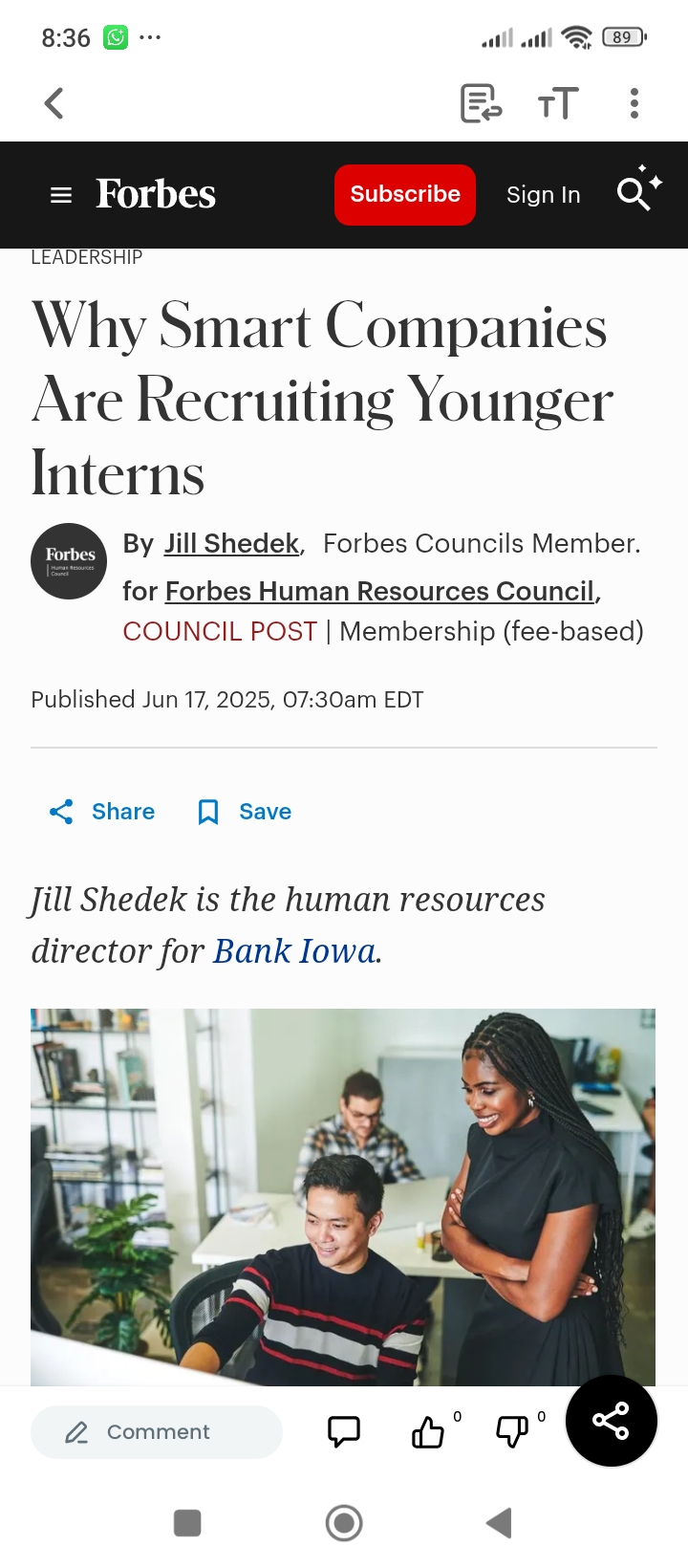In the past, interns got a bad rap from employers. Their inexperience was seen as a liability; their eagerness, a barrier to effectiveness. However, their fresh perspective, general enthusiasm and tech fluency can be superpowers that breathe new life into an organization. Considering more employers are planning to pursue or increase intern hiring, it's clear they're beginning to recognize the potential of younger talent.
In fact, I believe we'll begin looking beyond college seniors and recent grads as intern candidates. At Bank Iowa, the financial services leaders who mold and shape our teams have onboarded college juniors, sophomores and even freshmen to our internship program.
Tapping into this young population may be a smart move if organizations want to ensure there's a skilled talent pipeline available in the future.
How Employers Benefit From Internships
Less-experienced interns can be a positive presence in organizations. They have an ultra-green viewpoint that's unclouded by corporate bias, which can help mitigate stagnation within a team. When things are going well, the pace of innovation can slow because no one is motivated to "fix what isn't broken." A younger intern, though, won't have a team's standard problem-solving approaches in mind, so they can help open the floodgates for new ways of approaching old problems.
Because they arrive at your organization without certain workflows or norms already ingrained in them, younger interns have fewer habits to unlearn. This often means they're more open to learning how things work at your organization, bringing a curiosity that can reduce overall training time. Additionally, if you invite successful interns back to the program in following years, you can continue building their institutional knowledge and develop them into perfect-fit full-time candidates.
A certain measure of loyalty comes with hiring interns. If you're their first major employer, you'll likely become their gold standard for defining what a "good job" looks like. This can be tough to compete with once these young professionals officially enter the workforce.
How Interns Benefit From These Programs
With inflation rising and a potential recession looming, students may be more inclined to ensure the degree they're pursuing is worth the high price tag. By offering an internship program, you give them the chance to experience their intended career early. This will either confirm their interests or reveal misalignments that they can correct before too much time and money are invested.
For example, most of our interns take standard economics classes. But because we focus on clientele in agriculture, we've inspired past interns to take more-specialized business courses. After working with farm families and agtech firms in rural Iowa, these students wanted to deepen their understanding of agricultural banking and its nuances.
When college freshmen and sophomores can access internships, they have more opportunities to learn what kind of workplace environment fits their needs. Knowing this in advance will make their career journey much easier. For example, they might assume they want a remote or autonomous role until they actually try it and realize they need more structure.
3 Common Challenges To Address
Any change in your talent strategy is bound to be accompanied by a few hiccups, and lowering the average age of interns is no different. Here are some common challenges you might face, as well as ways to mitigate them.
• Higher Likelihood Of Mistakes: Younger interns may lack the polish that college seniors or recent graduates have, which can increase their chances of making mistakes. But you can turn those missteps into teachable moments. By preparing managers to offer guidance and have difficult conversations more effectively, you'll provide a safe space for interns to learn and build toward success.
• Less Familiarity With Work Culture: Today’s college freshmen were early teens during the height of the Covid-19 pandemic. So, many of them lost the chance to have part-time jobs or volunteer—experiences that can be vital for navigating a workplace successfully. One way to overcome this is by establishing low-pressure settings, like one-on-one coaching, for younger interns to learn and practice professional interactions.
• Delayed ROI: When you hire interns who need to return to college at the end of the program, typical conversion timelines are thrown off. You may risk losing out on future candidates altogether. However, we’ve found that inviting younger interns back for multiple summers can nurture loyalty and keep future hires close.
How To Find Quality Interns Sooner
Traditional hiring methods may not work as well with younger interns. To bring more of them to the table, consider building partnerships with colleges and tapping into your internal network.
Colleges benefit when more of their students connect with the business world earlier. That’s why more schools are teaching younger co-eds how to find the right internship opportunities and stand out among other candidates. Consider contacting local colleges' career services departments to discuss potential avenues of collaboration.
Your current workforce may have the connections you need to engage with younger interns. Be intentional about letting employees know that you're interested in students early in their college career. Explain the kind of intern you're looking for, and encourage employees to think broadly when it comes to making introductions.
Unlock The Potential Of Internship Programs
People at the beginning stages of their careers can reenergize an internship program, acting as a force multiplier that elevates the experience for mentees and mentors alike. While it takes intentional effort to guide younger interns, the returns of a stronger pipeline, deeper loyalty and a more resilient workforce are worth the investment.


You must be logged in to post a comment.